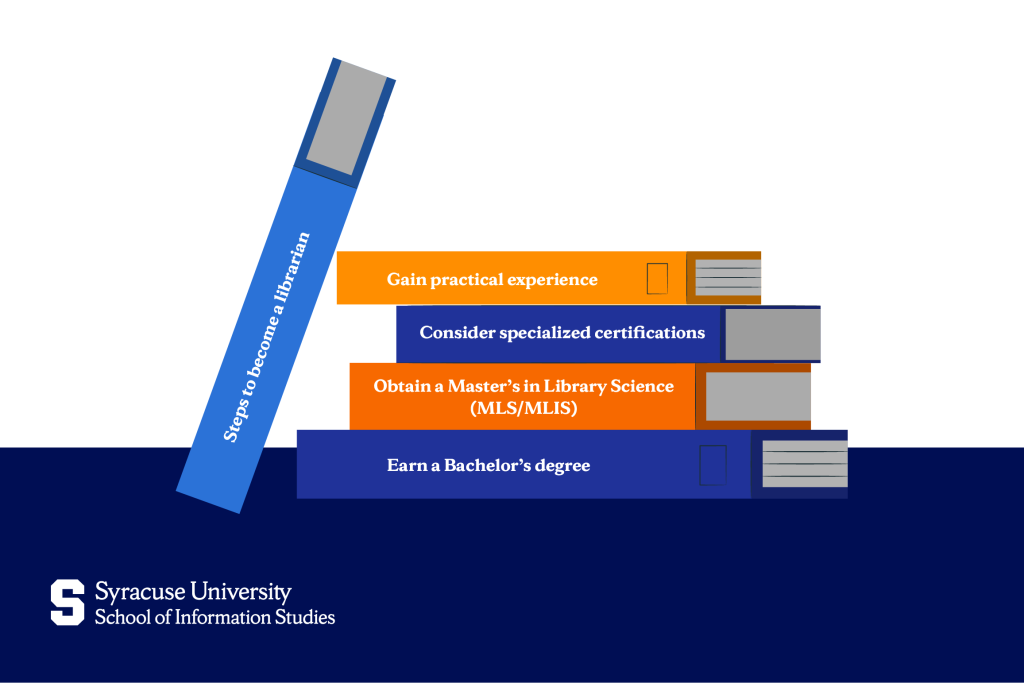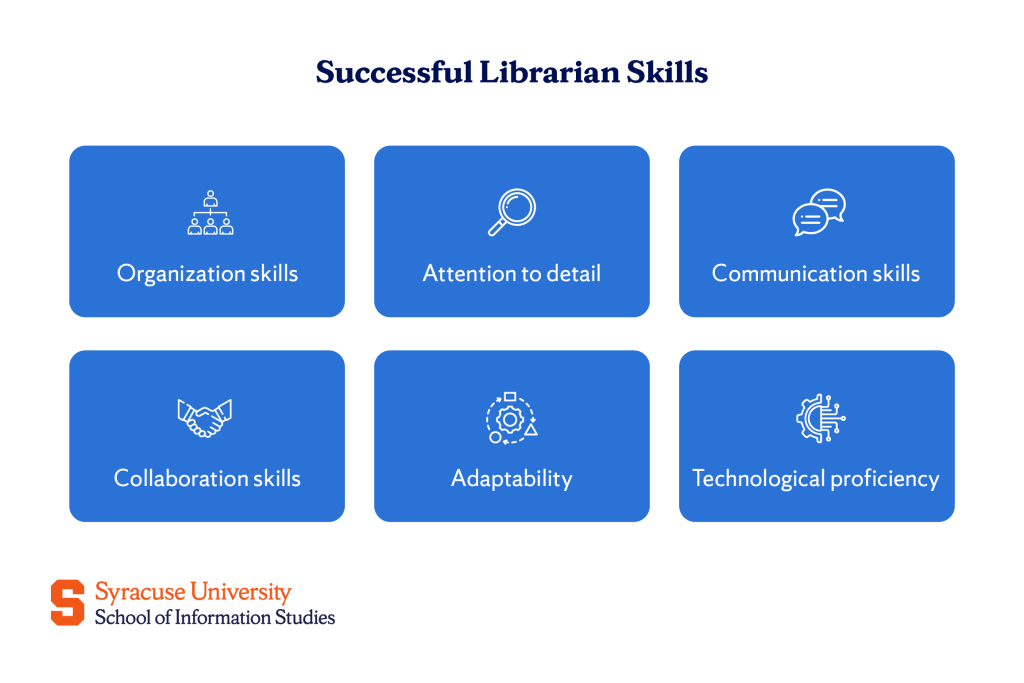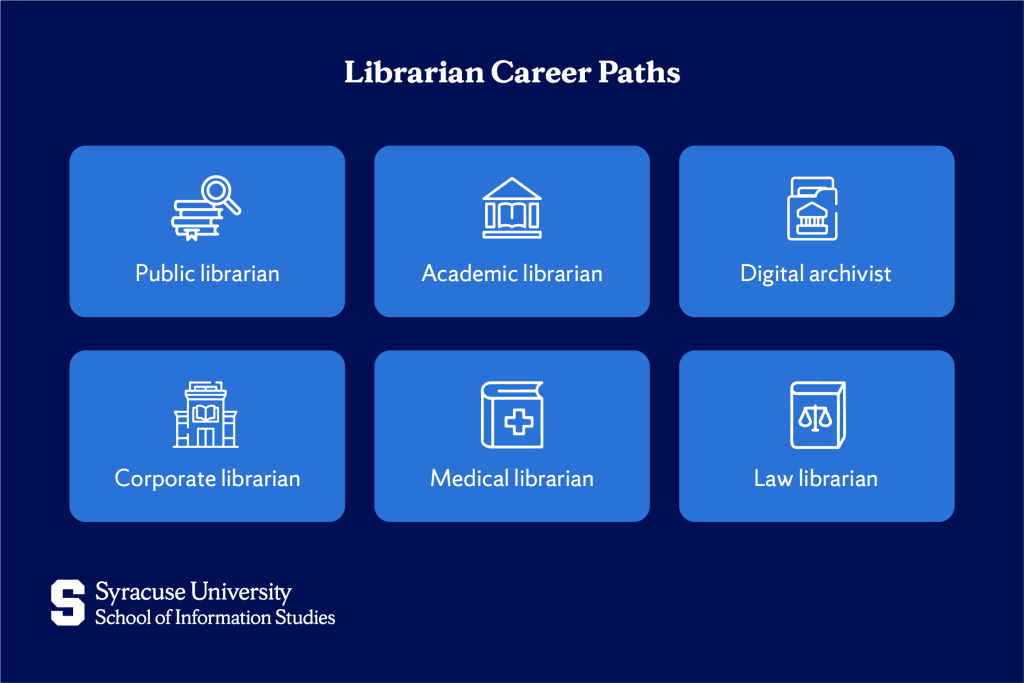Key Takeaways
- Key skills for librarians include organization, communication, adaptability, and technological proficiency.
- Employment of librarians is expected to grow by 2% from 2024 to 2034, with approximately 13,500 job openings projected each year.
- Achieving long-term success as a librarian requires actively engaging with the profession and continuously building skills.
Librarianship today goes far beyond shelving books or managing quiet reading rooms. Driven by information, librarians and information professionals, in general, serve as educators, digital curators, archivists, data specialists, and community advocates.
These professionals help people find and evaluate information, preserve valuable records, support learning at all levels, and connect communities with the resources they need. Their work directly influences how knowledge is organized, protected, and shared in both physical and digital spaces.
So, if you’re interested in this career, knowing how to become a librarian is the first step in planning for it.
Steps To Become a Librarian
The role of a librarian has changed quite a bit, especially with the rise of information and communication technologies (ICTs). Not long ago, librarians mostly concentrated on cataloging and organizing physical books and scrolls, but today, their responsibilities have expanded to handling online catalogs, e-books, and digital archives, too.
As libraries adapt to these advancements, librarians must pursue formal education and training so they can be prepared to manage the demands of today’s library profession.

Step 1: Earn a bachelor’s degree
Some of the most common bachelor’s degree majors for future librarians include English, history, or information science. However, the exact degree you choose isn’t as important as focusing on developing strong research, organizational, critical thinking, and other transferable skills.
What matters is that the degree you choose prepares you for the master’s program ahead, which is where your focus will shift more directly toward librarianship.
Step 2: Obtain a master’s in library science (MLS/MLIS)
After earning your bachelor’s degree, the next step is to pursue a master’s in library science (MLS) or a master’s in library and information science (MLIS). Such a degree is necessary for most librarian positions, especially in public, academic, and special libraries.
According to the American Library Association (ALA), an MLS/MLIS from an ALA-accredited program is the standard qualification for most roles. This is important because an ALA accreditation ensures the program meets the industry’s educational standards and prepares students for the challenges they’ll face in the field.
Syracuse University’s iSchool offers a highly regarded Master’s Degree in Library and Information Science that is accredited by ALA. The program aims to develop leaders in the field of library and information science, preparing them to advocate for information justice, equity, community engagement, and the use of technology in their communities.
For those who need a more flexible option, iSchool also offers an Online Library and Information Science Master’s Degree program, which provides the same education but with the added convenience of the online format. This way, it enables students to learn at their own pace and from the comfort of their own homes.
For aspiring librarians who are specifically interested in working as school librarians, iSchool offers a School Media Concentration for the LIS master’s program. It provides a focused track for those looking to specialize in educational environments.
Step 3: Consider specialized certifications
Specialized certifications can be a valuable asset for career advancement, and some positions may even prefer or require them.
Certifications, such as the Digital Archives Certification or the Certified Public Library Administrator (CPLA), can help set you apart in a competitive job market, especially in fields that require specialized knowledge, like digital archives management or library administration.
Step 4: Gain practical experience
To become a librarian, you also need experience to prepare yourself for the daily challenges of managing library systems. For students, internships are one of the most suitable options to achieve that. They enable students to build important skills and gain firsthand insight into the day-to-day operations of a library.
Volunteering is another excellent option to build experience and gain insights into library operations. One of our students, Hung Phung, recalls:
People in my community did not understand why I would volunteer my time at the library. They wondered if I benefitted somehow financially.
But those words didn’t deter him. In addition to volunteering, Phung took it upon himself to learn more about library operations by reading books on children’s psychology, engaging with kids, and researching other libraries.
This self-driven learning proved invaluable when he went on to establish Local Bookable, a non-profit organization that supports community libraries in Vietnam. Today, his Vietnam Local Library Network boasts over 30 member libraries. His experience demonstrates how volunteering can lead to more than just building skills—it can spark new opportunities and create lasting change.
Entry-level positions like library assistants or technicians can also provide great ways to gain experience. These roles offer opportunities to learn how libraries are run on a day-to-day basis and help you build the practical skills needed to advance in your career.
Essential Skills and Qualities of a Successful Librarian
A successful librarian needs a range of skills, some of which are learned through formal education, while others are more innate qualities that point to a person being suitable for this role, even before they begin their tailored education and training.
Our student, Heather Crane, who was working in retail at the time, experienced this firsthand when she took a career aptitude test that suggested she would make an excellent librarian. She recalls:
I looked up the job requirements and realized I already had many of the same skills: customer service, instruction, inventory management, etc. All I needed was a master’s degree.
Some other skills and qualities that make a successful librarian include:
Organization and attention to detail
Being organized is arguably the most important skill for a librarian since it’s one of their primary duties to make sure that everything in the library is properly stored, labeled, and easily accessible for users.
Maintaining digital systems, such as online catalogs and databases, also requires careful attention to detail.

Communication and collaboration skills
The specific patrons librarians interact with can vary depending on where they work, but generally speaking, they engage with quite a diverse range of people. To make sure that they can assist all patrons in finding the information they need, they must have strong communication skills.
Additionally, collaborating with colleagues is key to managing projects and new initiatives.
Adaptability and technological proficiency
As mentioned, librarians’ responsibilities have changed drastically over the past few centuries. They had to adapt then and must continue to do so as needed, especially with technology advancing at such a rapid pace.
Part of this is also the need to stay ahead of technological trends so that they are able to work with digital resources, e-books, and even emerging technologies like AI.
Career Paths and Specializations in Library Science
Many people assume that being a librarian is the same role everywhere, but in reality, library science offers a variety of career paths and specializations. Depending on where they work and their area of expertise, librarians can have different roles that focus on serving specific needs or industries.
Some of the options available in library science include roles as:
- Public librarian – Working in community libraries, providing resources and programs for a diverse public
- Academic librarian – Working in educational institutions, supporting faculty and students with academic resources
- School librarian (K–12) – Guiding students in developing literacy and research skills while partnering with educators to enrich the classroom experience.
- Archivist – Preserving and organizing historical records in settings such as museums, government agencies, or corporations to maintain access to important documents over time.
- Digital archivist or metadata specialist – Managing and preserving digital resources so that they’re properly cataloged and accessible
- Special librarians (corporate, medical, law) – Working in specialized fields like business, healthcare, or law, managing niche information for specific industries
- Information professional – Working across sectors to support digital literacy, oversee knowledge systems, or lead community-based information initiatives beyond traditional libraries.

Salary and Job Outlook
Librarianship offers a promising future in terms of financial earnings as well as job outlook. Data shows that the median annual wage for librarians and library media specialists is $64,320. However, some of the highest earners in this field can reach six figures, too.
Employment is expected to grow by 2% from 2024 to 2034, which indicates a steady demand for library services, with approximately 13,500 job openings projected each year.
Tips for Success in a Librarian Career
Achieving long-term success as a librarian requires actively engaging with the profession and continuously building skills. One of our graduates, Heather Owen, who holds both a master’s in library and information science and a certificate in data science from the iSchool, emphasized the importance of getting involved in professional conferences and gaining experience in presenting, claiming that:
Professional conferences want young people to succeed. They want them to get practice. Researchers are interested in what the ‘young people’ are interested in within the field.
Another tip from Owen is the importance of starting early in the job search. While working as a research assistant during her graduate studies, she began applying for jobs over winter break in her final year. She advises current students to start applying for jobs early and recommends putting together their CVs in the first year of graduate school and refining them throughout their studies.
It’s also important to keep learning and stay current with the latest trends in library science. Attending workshops or taking online courses in new technologies can help expand your skill set. Finally, building a strong professional network through connections with fellow librarians and mentors can provide valuable guidance and open doors for future opportunities.
Final Reflections on How to Become a Librarian
The profession of librarian has naturally undergone changes over the years, yet it remains one of the most impactful professions. In recent decades, it has increasingly been recognized as a socio-technical field, as it now combines traditional library practices with the integration of advanced technologies.
Therefore, now, librarianship requires a unique blend of library and information science competencies, which are necessary to meet the demands of the modern librarian role. At iSchool, we offer specialized programs that are designed to help you develop exactly those skills. So, join us, and we’ll help prepare you for this role, as well as make sure that you’re equipped to adapt to any changes the profession may face in the future.
Frequently Asked Questions (FAQs)
How long does it take to become a librarian?
Becoming a librarian usually takes about 6 years—4 to complete a bachelor’s degree and another 2 for a master’s.
Is it hard to get a job as a librarian?
The job market can be competitive, but with the right master’s degree and some hands-on experience, opportunities remain steady and accessible.
Can someone become a professional librarian without having any formal education in library science (library & information science)?
It’s not common, as most librarian positions require a master’s degree in library and information science (MLS/MLIS), but in some cases, other relevant experience may be considered.
I have an unrelated bachelor’s degree. What do I need to do to become a librarian?
If your bachelor’s degree isn’t in a related field, you can still become a librarian as long as you are able to earn a master’s in library science.
